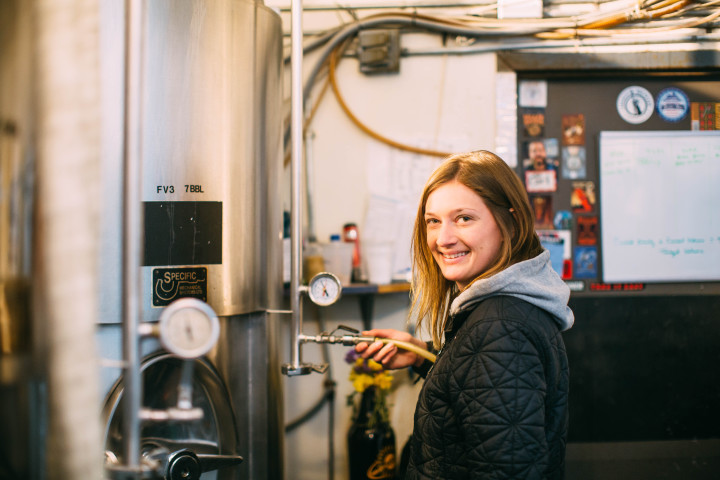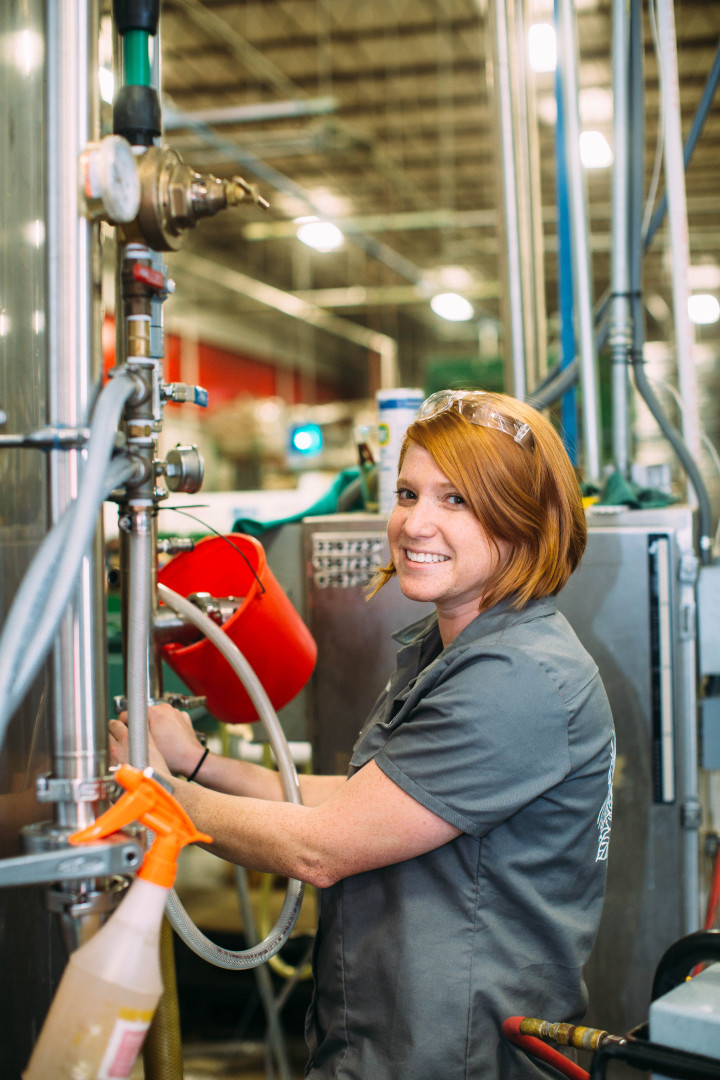Breweries continue to pop up around Asheville faster than the temperature changes this winter, and more and more often, women pull on their brewing boots and help make it happen.
Leah Tyrell was preparing for a career in wine when she moved to Asheville. Three years later, she’s not only switched from wine to beer, but she’s also running the brewhouse at the Asheville Pizza and Brewing location on Merrimon Avenue. Tyrell is one of just a half-dozen women who work as brewers in Asheville. Almost all of them are members of Pink Boots, a national organization that provides scholarships for brewing education programs.
“I’ve always liked beer more than wine, but I guess for a while I didn’t realize the opportunities there were in craft brewing,” says Tyrell.
That changed when she moved to Asheville. Tyrell got a job as a bartender at Asheville Pizza and Brewing but she found where she really wanted to work was in back — in the brewery. “I was following brewers around, asking them questions about everything,” says Tyrell. “[Pretty soon] the opportunity came up to work a couple days a week on the canning line. … I jumped at it.”
From there, Tyrell did everything she could to move into a brewing role. She continued to homebrew and completed an online program through the Siebel Institute of Technology.
Her hard work paid off. Now Tyrell makes everything from Roland’s ESB and Shiva IPA to small-batch specialties at the Merrimon Avenue brewery.

Just one of those things?
Tyrell’s story isn’t uncommon in the world of brewing, with many breweries growing fast enough to create plenty of new positions. But she’s still in the minority: Nationwide, few brewers are women, and that’s the case locally too.
Depending on how you count them, there are 19 breweries in Buncombe and 13 more if you count the surrounding area. Those facilities boast 75 local brewers — meaning the people hired to brew beer and/or control fermentation. Barely a half-dozen of them are women in brewing roles.
This disparity isn’t unique to Asheville, to North Carolina or to the East Coast. Breweries in general tend to attract more male employees, and the role of brewer in particular attracts male applicants.
Brewing also isn’t the only industry to skew toward a specific gender. According to Forbes magazine, nearly 30 percent of women work in just 10 occupational fields. This leads to a disproportionate number of women in those fields. In public schools, for example, about 75 percent of teachers are women.
Yet when it comes to brewing, there are a couple of gender-specific issues. “Science and math fields have difficulties attracting women, and brewing is rooted in science and math,” says Hollie Stephenson, head brewer at Highland Brewing Co. That hits on one: the inherent — and much discussed — bias of math and science fields. Men are twice as likely as women to be employed in science, technology, engineering and math fields, according to a 2013 Census Bureau publication.
The second challenge, though, speaks to a common perception about brewers. “I think brewing is just one of those things [that’s] always been viewed as a manual labor-type job,” says Shannon Butler, assistant brewer at Highland. “And to some degree that’s true; there is certainly a manual labor component for every brewer.”
That perception applies to all breweries, though in practice smaller breweries tend to require more manual labor. Small operations often have just one or two brewers who do everything, rather than specialists for each particular part of the process. These operations also often don’t have the equipment that larger breweries have to make the work less physical — for example, a grain chute to move malt from the ground level up into a brew kettle.
Yet the perception that the work of an assistant brewer at a small brewery is a man’s work isn’t accurate, says Katie Smith, assistant brewer at Twin Leaf.
“Some people think guys in the brewery are helping me with this or that, or that I don’t physically lift and move things around — but that’s just not true,” says Smith. “I can lift 55-pound malt bags, and I can move and lift kegs just fine.”
Stephenson agrees: “People will say that you might have to hold 50-pound malt bags over your head over and over because of where the mill is positioned, or that you may have to carry heavy kegs up a flight of stairs — so that would be a reason a woman couldn’t work in some places. However, the bottom line is that, in those examples, being able to work as a brewer is not a gender issue but a process issue. A good brewer, male or female, should be able to navigate [any brewery] founded in efficiency and safety.”
Being there
The largest hurdle might be that breweries often fill brewhouse openings with current employees. How important is already being on staff, waiting in the wings? Of the six women interviewed in Asheville, four were working for a brewery at the time they were hired for the brewhouse, and one was already working at a craft beer bar.
“I definitely fell into my job at the brewery,” says Tristan Chapell, assistant cellar manager at Oskar Blues. “I grew up in Brevard and went to school for blacksmithing and metal fabrication at Penland. I’ve always had an interest in mechanical concepts and how things work, and I’ve always been a big fan of beer.”
Yet when she moved back to Brevard, Oskar Blues was just opening and needed help. “I took the taproom job, but I quickly became interested in everything on the floor,” says Chappell. “I spent time on days off brewing, in the cellar, and learning about the packaging line. Eventually, they needed the help, and I found my niche in the cellar.”

Smith also got into brewing from a front-of-house job. A month or two after she started working in Twin Leaf’s taproom, it was clear the brewery was only getting busier and help was needed in the brewhouse. As owners Steph Estela and Tim Weber discussed bringing someone on, Smith spoke up. “I pretty much raised my hand and said, ‘I’d like to help, and I’m already in school learning how to do this,’” says Smith. “Now I work in the brewery just about every day instead of behind the bar.”
Amanda King, assistant brewer at Asheville Pizza and Brewing, is the exception to the rule. A student in A-B Tech’s Brewing, Distillation and Fermentation program, she interned at Asheville Pizza and Brewing in a brewing role before being hired. “I credit the program with getting me this job,” says King. “It definitely got my foot in the door, and it created a nice transition … to move from an internship to a real position.”
A budding community
While most of the women interviewed hadn’t met many of the other women at other Asheville breweries, almost all are either members of the Pink Boots Society or considering membership.
Pink Boots is open to any woman who works in or makes money from the craft-brewing industry. Its name and logo are a reference to women who brew (since brewers typically wear black waterproof boots).
With more than 1,500 members, larger brewing cities have enough women in their chapters to meet in person. Stephenson says she attended in-person meetings when she lived in San Diego that ranged from a dozen women to more than 50, and she’d like to see meet-ups get off the ground in Asheville. “Soon, we’re going to have a critical mass of women working in the industry here in Asheville,” says Stephenson. “Things are definitely moving in that direction.”
To kick things off even sooner, Stephenson says Highland will take part in this year’s International Women’s Day, which is organized by Pink Boots in the United States.
“Basically any brewery that has a female brewer can sign up to participate, and the breweries all riff on a recipe that has some set specifications when they brew that day,” says Stephenson. “Then a percentage of sales goes to Pink Boots for brewing scholarships and a portion goes to a local charity of the brewery’s choosing.”
The brew day is Sunday, March 8, though the beer won’t be released until it’s ready a few weeks after that.
Chappell didn’t know if Oskar Blues would be taking part this year, but she is a Pink Boots member who wants to see more in-person interaction locally. “I think the organization is great on a national level because it’s important to connect to other women in these roles — to see profiles of them, where people are moving to next, that sort of thing — it helps bridge the gap.”
That said, Chappell says online interaction can’t do it all. “I went to Longmont [Colo.] to visit and was part of the Pink Boots Denver chapter collaboration brew,” says Chappell. “Doing that sort of thing here, meeting in person and learning from each other and hearing what’s going on at our other breweries … I definitely want to help make that happen.”
Whether Asheville’s women in brewing officially start a chapter this year or not, it’s clear they’re part of a group that takes cues directly from the larger community of craft beer.
“I’ve had people ask if I’m competitive with the other women who brew either in town or in general,” says Smith. “To be honest, I’m competitive in the same way that craft breweries are: We all want to be the best, and we all want to sell beer, but there’s a lot of potential out there for all of us. We all feel really good about the future.”




Before you comment
The comments section is here to provide a platform for civil dialogue on the issues we face together as a local community. Xpress is committed to offering this platform for all voices, but when the tone of the discussion gets nasty or strays off topic, we believe many people choose not to participate. Xpress editors are determined to moderate comments to ensure a constructive interchange is maintained. All comments judged not to be in keeping with the spirit of civil discourse will be removed and repeat violators will be banned. See here for our terms of service. Thank you for being part of this effort to promote respectful discussion.